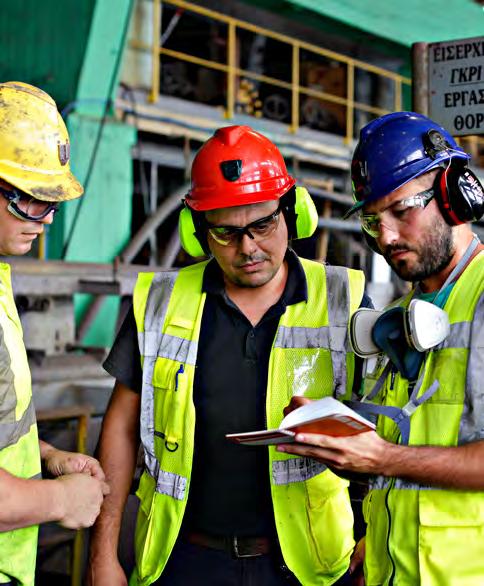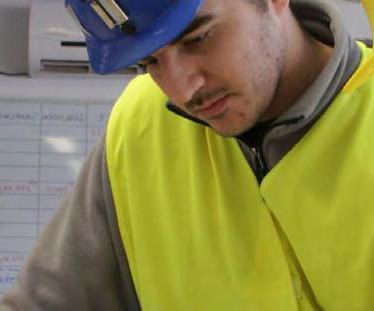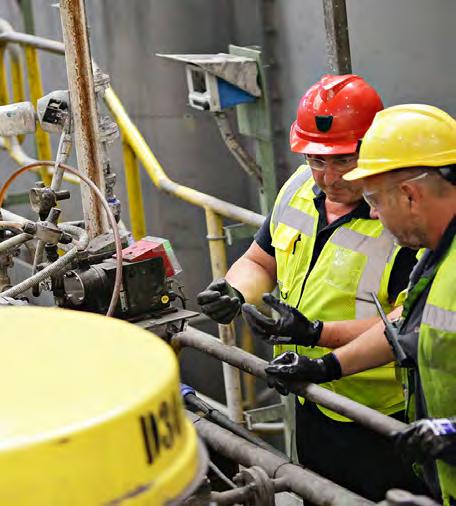4 | Water & Tailings Clean and readily available water is vital to human life and well-being of ecosystems and agriculture. Given its vital importance, access to water can be an issue for local communities, making responsible water use a key focus area for our operations, our environmental stewardship and relationships with local Stakeholders.
Managing water use and discharges Good Practice
Efficient and Effective Water Management We implemented the Basdekis Creek diversion in Olympias to prevent water from entering our underground mines and endanger our employees’ safety, maintain the local water quantity balance and maximize available clean water. Furthermore, we have developed a complete water management plan regarding Skouries mine water, which allows us to process and supply water to nearby communities for household use and irrigation.
Water sources: Majority of water we use is groundwater flowing into our underground mines, with small additional volumes of collected and processed contact water that falls into our facilities and municipal supplies. It must be noted that Skouries has been designed as a minimal water discharges site and most of our water use is from recycled water. Water processing and discharge: Our processing plants recycle and re-circulate used water to minimize freshwater consumption and allow for zero discharges. We collect, treat and reuse for industrial water uses any contact water that falls within our sites, which is then safely discharged back into the environment once water quality standards are met. We continuously monitor water quality before the treatment (e.g. pH, conductivity and metal content) at the exit of water treatment plants (i.e. final discharge point), in order to comply with the respective effluents discharge limits defined by the Joint Ministerial Decision of Approval of Environmental Terms regarding various discharge parameters (e.g. pH, Arsenic-As, Lead-Pb, Zinc-Zn, Manganese-Mn, Cadmium-Cd, Nickel-Ni, Total Suspended Solids-TSS). Furthermore, we: •D o not discharge contact water in our mines openly back into the environment
Availability and access to water is critical for our operations, as we use water for mineral processing, dust suppression, slurry transport and personal consumption. Therefore, we: •H ave extensively assessed our projects’ water-related impact, as part of our Environmental Impact Statements (EIS), which have been prepared by the Hellenic Authority for Geological and Mineral Research (EAGME) and are available online •H ave set corporate targets to reduce freshwater consumption (i.e. water from privately owned drinking water drillings or municipal drinking water network) •A pply water management and recycling practices throughout our operations to strictly control water use across all sites and limit our impact on water sources • Monitor water use continuously through flow meters •R ecord water-related data at a granular level per site, which allows us to identify opportunities for increased efficiency at every stage of our operations •T ake regularly water quality samples from groundwater and surface water sources within and around our sites, in order to compare them with the limit values defined by respective regulations and our operating permits •D isplay continuously water quality analyses results to Stakeholders through our environmental monitoring platform (see Section 4.1) and also quarterly and annually communicate them to government and relevant authorities.
60
Hellas Gold
•U se water-diversion channels to redirect non-contact surface water flows away from our sites, in order to ensure the quality and the safety of water downstream •C apture, store and reuse precipitation or groundwater entering our sites, apart from water evaporated.
0
water sources significantly affected by our water withdrawal
0
water bodies and habitats significantly affected by our water discharges
2,629
thousand m3 of water recycled
23.5%
of our total water withdrawal recycled
58.9%
of total water usage recycled














